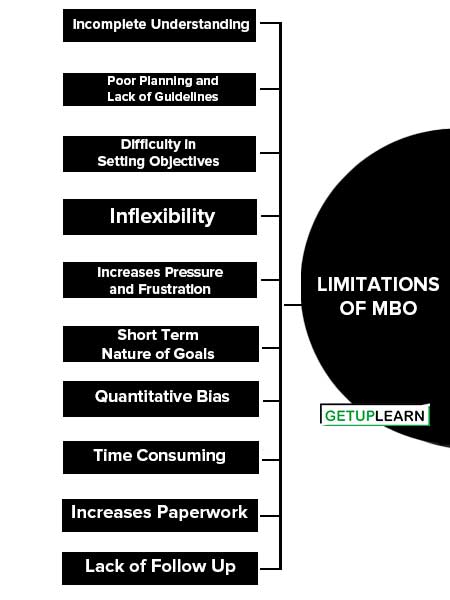MBO is not a panacea, for organizational problems. Quite often many organizations look at MBO as an instant solution to their problems. They fail to recognize that MBO demands careful planning and proper implementation.
Many organizations have been overwhelmed by the problems of MBO. Some of the problems are present in the MBO system itself and others emerge due to wrong implementation.
Table of Contents
-
1 Limitations of MBO
- 1.1 Incomplete Understanding
- 1.2 Poor Planning and Lack of Guidelines
- 1.3 Difficulty in Setting Objectives
- 1.4 Inflexibility
- 1.5 Increases Pressure and Frustration
- 1.6 Short Term Nature of Goals
- 1.7 Quantitative Bias
- 1.8 Time Consuming
- 1.9 Increases Paperwork
- 1.10 Lack of Follow Up
- 1.11 Other Weaknesses
- 2 FAQ Related to the Limitations of MBO
Limitations of MBO
Let’s discuss the limitations of MBO:
- Incomplete Understanding
- Poor Planning and Lack of Guidelines
- Difficulty in Setting Objectives
- Inflexibility
- Increases Pressure and Frustration
- Short Term Nature of Goals
- Quantitative Bias
- Time Consuming
- Increases Paperwork
- Lack of Follow Up
- Other Weaknesses

Incomplete Understanding
Incomplete Understanding of MBO Philosophy: Managers involved in practising MBO, some- times do not understand what purpose it serves, how the objectives are set and performance is appraised, how the results will be analyzed and how the organisation will be benefited. Moreover, managers continue to think in their old way and do not appreciate this new philosophy.
Hence they fail to teach the philosophy of MBO to their subordinates, as they lack initiative and fail to enthuse others to participate, thus MBO appears to be simple to teach but it is not so easy to put into practice.
Poor Planning and Lack of Guidelines
One of the major weaknesses often associated with MBO is poor planning of the programme prior to implementation. Implementers must know how to involve personnel at all levels of management and obtain their support.
Like any other kind of planning, MBO cannot work if those who are expected to set goals are not provided any guidelines. They must know what the organisational objectives are and how can they fit themselves in them.
Difficulty in Setting Objectives
Objective setting is the prime step in the MBO process. It requires verifiable objectives against which performance may be appraised. The setting of objectives is more difficult in some areas, especially where they cannot be presented in quantitative form.
In such cases, it becomes difficult to qualify the performance and compare that with the objectives. Effective goal setting requires proper study of human nature, behaviour and expectations to set attainable and reasonable objectives.
Inflexibility
Management by objectives may tend to introduce inflexibility in the organization. Since goals are set in every six months or one year, the superior may not like to modify them in between because of fear of resistance from the subordinates.
Koontz and Weihrich state, “It is foolish and dangerous for a manager to strive for a goal that has been made obsolete by revised corporate objectives, changed premises, or modified policies.
Increases Pressure and Frustration
According to some critics MBO actually increases pressure on the subordinates and sometimes, MBO creates frustration among managers. This is due to the reasons that:
- Many organisations could not implement MBO properly and even the organisation is not able to work with its old system.
- Introduction of MBO arouses high expectations in young managers. They are over-enthusiastic in making rapid change in terms of growth and profitability for organisation and career development for themselves. If rate of change is slower than the expected, then they feel frustrated.
Short Term Nature of Goals
In most MBO programmes, managers set goals for the short run usually for a year or even less. This is dangerous for the long-term development of the organisation. It is also found that strategic goals are displaced by operational goals.
Quantitative Bias
In order to have verifiable and measurable goals, managers overuse quantitative goals and attempt to force the use of numbers in areas where they are not applicable. They may also downgrade important goals that are difficult to state in quantitative terms or end-results.
Time Consuming
A great deal of time to carefully set objectives at all levels of the organization is required in MBO. Initially to built confidence in subordinates in the ‘new system’ superiors may have to hold many meetings. The formal, periodic progress and final review sessions also consume time. So MBO is a time consuming process.
Increases Paperwork
MBO programmes introduce a tidal wave of newsletters, instruction book- lets, training manuals, questionnaires, performance data, and reports into the organization. To know of what is going on in the organization, managers may demand regular reports and data in writing, thus MBO imposes burdensome paper work.
Lack of Follow Up
Lack of follow-up by the superior at the appropriate time is another hurdle in the successful implementation of MBO. It is most easy to procrastinate. The superior must get to the subordinate at the appropriate time. The subordinate should be prepared to tell the boss exactly what has been accomplished and how.
Other Weaknesses
- It can be used as a threat by overzealous managers. Managers turn MBO into a sham, and start playing games.
- The programme is used as a ‘whip’ to control employee performance.
- Top managers provide inadequate support.
- It leads to a tug-of-war in which the subordinate tries to set the lowest possible targets and superior the highest.
What are the limitations of MBO?
The following are the limitations of MBO:
1. Incomplete Understanding
2. Poor Planning and Lack of Guidelines
3. Difficulty in Setting Objectives
4. Inflexibility
5. Increases Pressure and Frustration
6. Short Term Nature of Goals
7. Quantitative Bias
8. Time Consuming
9. Increases Paperwork
10. Lack of Follow Up
11. Other Weaknesses.












